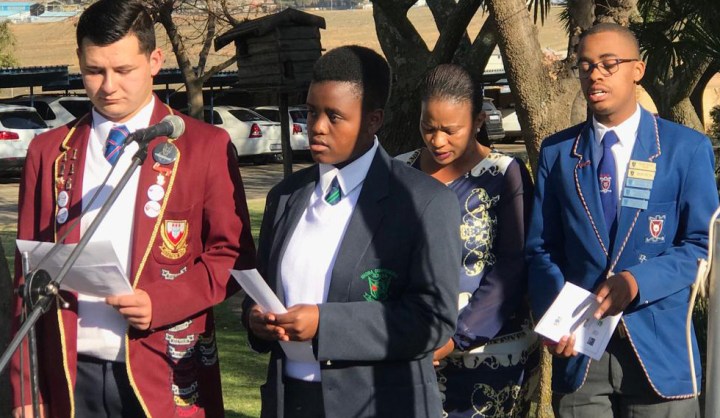Twinning Schools
Groundbreaking ‘twinning’ includes first Afrikaans school to join forces with another

On Wednesday 28 August, the Gauteng Department of Education officially announced the twinning of Hoërskool Bastion and Madiba Comprehensive Secondary School, two of three pairs of school to be twinned in the province, and the first involving an Afrikaans school.
“We the people of South Africa, recognise the injustices of our past; honour those who suffered for justice and freedom in our land; respect those who have worked to build and develop our country and believe that South Africa belongs to all who live in it, united in our diversity…”
These were the words that reverberated through Hoërskool Bastion’s assembly on Wednesday morning when learners of the newly “married” schools – now called MadiBas – read the Constitution’s preamble.
According to Gauteng Department of Education, Bastion is the first Afrikaans school to participate in the twinning programme – an initiative aimed at “reorganising” schools in the province to share resources and which was first piloted in 2015.
Under the administration of MEC Panyaza Lesufi, the department has been critical of monolingual schools for what it sees as an attempt to use language to exclude learners from poor backgrounds. His stance has been met with resistance from some quarters who accuse him and the department of being anti-Afrikaans.
Speaking to Daily Maverick, GDE’s Head of Department, Edward Mosuwe, said: “We are trying to get schools that are well resourced, or for schools to get to know they can share resources and benefit each other.”
The programme sees a well-resourced school twinned with a poorly resourced school with the aim that the resourced school will share sports and academic facilities with the underresourced school. In turn, the poorly resourced school may be able to provide teaching capacity for subjects that the other school was unable to offer. The schools don’t physically merge, their school management remains separate but they are governed by a single school governing body.
Section 17 of the South African Schools Act of 1996 stipulates that a member of the Executive Council may determine that the governance of two or more public schools should lie in a single governing body if it is in the best interest of education.
Twinning is meant to improve the capacity of both schools to ultimately bridge inequalities while promoting non-racialism and social cohesion.
Mosuwe said the department identifies schools – with consideration for their proximity to one another – that can be twinned followed by a consultative process with the School Governing Bodies (SGB), educators, parents and learners. However, this twin school is different because the department did not make any suggestions that they should join.
“The SGBs, parents and management of the two schools voluntarily came together to do this on their own, without being forced, because they have seen the value and merit of this programme. It was not a forced marriage,” Mosuwe said.
Not all twinning attempts have been successful.
The department has been facing resistance from some schools which, according to Mosuwe, do not understand the intentions of the programme.
“The challenge is that there is a lack of understanding of what we are trying to achieve as a department. It’s just a problem of getting people to understand this process. Where we may have suggested schools that are in proximity to work together, some had seen it as if it was being imposed on them.”
The sharing of a single school governing body has been a key point of contention in the past. During its pilot phase, the department had identified 14 schools to be twinned, with only three agreeing to pair at the time.
On Wednesday, the head of department also announced the pairing of Mikateka Primary School in Ivory Park and Halfway House Primary in Midrand, Unity Secondary in Daveyton and Wordsworth High School in Benoni. This brings to 12 the number of schools that have been paired since the programme started.
The events on Wednesday were filled with jovial learners, educators and SGB members from MadiBas and previously paired schools, each of them sharing experiences of their scepticism of the programme before it was introduced.
“If you had told me three years ago that I would be standing in front of here as MadiBas, I would’ve shrugged it off as a figment of your imagination,” Theuns Naude, the chairperson of MadiBas, said during his address in which he likened the union of these two schools to the vision Nelson Mandela had for the country. DM



















 Become an Insider
Become an Insider